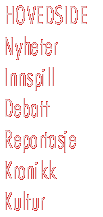
|
|
Redaktør: Teknisk ansvarlig:
|
|
Spørsmål angående engelsk
kan stilles til språkrådgiver Stewart Clark, Studieavdelingen,
e-post: stewart.clark@adm.ntnu.no, Repetition of words and sounds Some tips about repetition that may improve your English style (with some genuine examples of problems): Repeat a key word again rather than use another term such as «it» that might be misunderstood: The technical malfunction began before the last A favourite doggy ad shows the confusion that can result from not repeating a key word: German Shepherd for sale, obedient and will eat Do not place similar sounding words together if they have different meanings: The summer and fall measurements of the fall
(replace Figure 7 showed that the temperature showed
an increase (write «Figure 7 These clear effects will affect our budget (replace affect by «influence») The study has proved that the matter is proven (replace proven by «decided») Do not use a string of words containing the same sounds: There is to be no variation in hyphenation and capitalization (use «in the use of hyphens and capitals») Many major man-machine manifestations may ... (rewrite) Tricky words Complement, compliment These words are tricky because they sound the same, but have different meanings. One way to avoid confusing complement with compliment is that complement has two e's and always means something extra. Complement (Norw. utfyllende, supplerende) means to add
something to make a complete or perfect whole: «The fine
port wine complemented a perfect meal». There are numerous
other special terms including medicine, mathematics and linguistics
where complement is also used, but the basic meaning of
adding something remains. There is also a Compliment (Norw. kompliment) means to pay respect, praise, or say something admiringly: «We complimented the conductor after the outstanding performance». The related word complimentary conveys the same ideaof praise, but in another sense means something is free. Thus a common mistake is writing «our research groups have complimentary expertise» which means that the groups work for free. It is worth remembering that in a restaurant «a complimentary bottle of wine» means a bottle on the house, but «a complementary bottle of wine» is something you have to pay for. hardly, hard Hard (Norw. solid, hardt rammet) means something that is solid and firm. Other meanings are with great effort: «We tried hard to win» and badly, as in: «Many export businesses in Norway were hard hit by the sudden rise of the krone» (suffered a great loss). Hardly (Norw. knapt, nesten ikke) is best used in the
sense of scarcely: «We had hardly any money left».
It can also mean with difficulty: «They could hardly pay
the school fees». Serious misunderstandings occur when hardly
is used in the sense of badly(Norw. hardt rammet) as in: «Many
export businesses in Norway were hardly hit by the sudden rise
in the krone» (the intended meaning was suffered a great
loss but this may be understood to mean scarcely hit. If
hard hit or Enlightening English «Wimbledon tried hardly, but still lost». (A Norwegian coach trying to explain six successive losses to BBC 5-Live, April 2000) When the former Götabanken in Sweden changed its name to Gota Bank (replacing the Swedish letter ö), they send a letter to their close business contacts in English, which said: «Dear friends, we are the same guys as before although we have lost our pricks».
|

 Stewart's
Corner
Stewart's
Corner